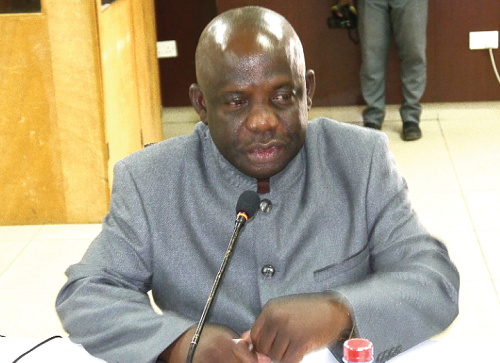
‘Help solve impact of climate, others on water resources’
Technocrats in the water sector have been asked to engage in more research in order to proffer scientific solutions to the negative impact of climate change and human activities on water resources. The Minister of Water Resources Works and Housing, Dr Kwaku Agyemang-Mensah, who made the call in Accra yesterday, said climate change had adverse effect on the sustainability of surface water, while enough work had not been done to effectively tap into groundwater for public use.
Advertisement
“Water is the control element of sustainable development and therefore, there ought to be a balance between the demand on water and the available resources,” he added.
These were contained in a speech delivered on behalf of the minister at the opening session of an international conference on integrated sustainable management of shared aquifer systems and basins of the Sahel Region.
Participants were drawn from 13 countries in the sub-region including Ghana, Benin, Burkina Faso, Cameroon, Chad, Nigeria, and Senegal. The mainly stakeholders and policy makers discussants are to share ideas, raise awareness and promote information sharing among the countries in the Sahel Region on how to sustain the use and management of water resources.
At the end of the meeting, they will come out with strategies and resolutions that would improve water resource management in line with national strategies and the sustainable development goals (SDGs).
National strategies
Dr Agyemang-Mensah explained that the government had prioritised the drilling of boreholes across the country, particularly in rural areas, as part of a national strategy to tap into ground water.
He said other strategies included a rural water and sanitation strategy based on community ownership and management, national environmental action plan, and private sector participation in the water sector.
He observed that even though the country had been endowed with both surface and ground water, challenges ranging from salinity, fluoride and arsenic contamination, identification of recharge and discharge areas to contaminant transport, continued to pose a major threat to effective management of the resource.
GAEC’s support
For his part, the Director General of Ghana Atomic Energy Commission (GAEC), Professor Benjamin Jabez Botwe Nyarko, said the use ground water ought to be viewed as a viable alternative that could boost water availability, especially when the activities of illegal miners had polluted surface water.
He added that the establishment of the Isotope Hydrology Laboratory by the GAEC in 2010, with support from the International Atomic Energy Commission (IAEC), had boosted the chances of addressing some of the challenges of managing ground water.
“The laboratory has been used to provide services in technical corporation projects, coordinated research projects, as well as national projects on water resources assessment using isotopes techniques,” he added.




